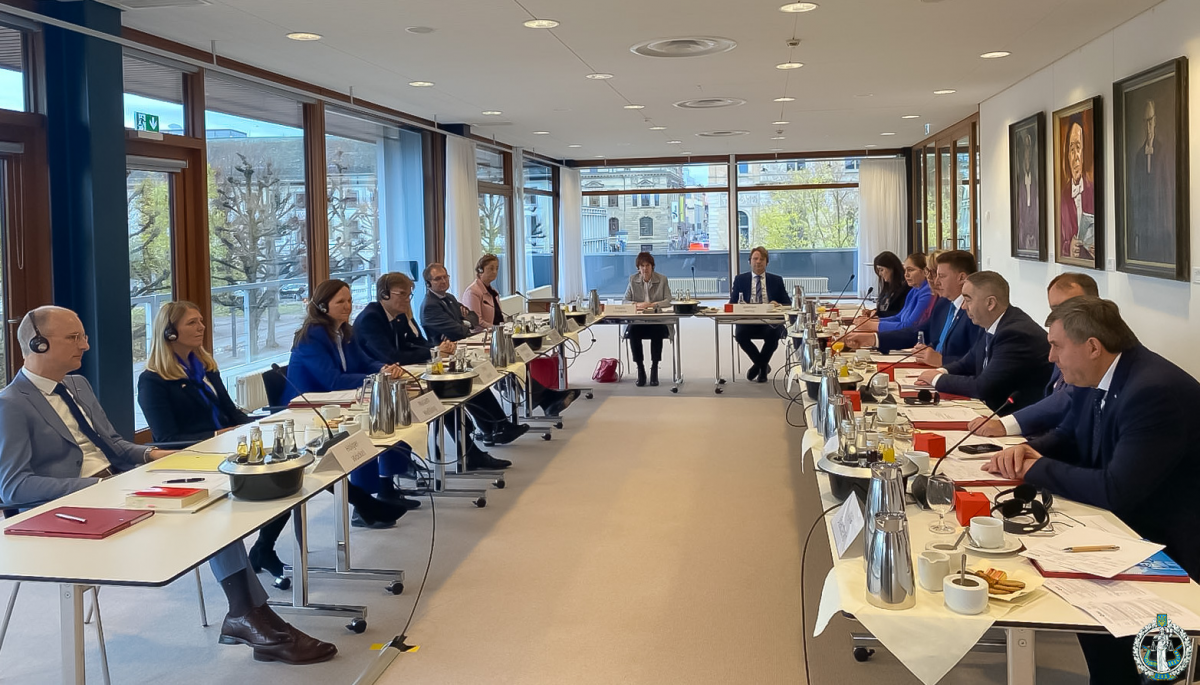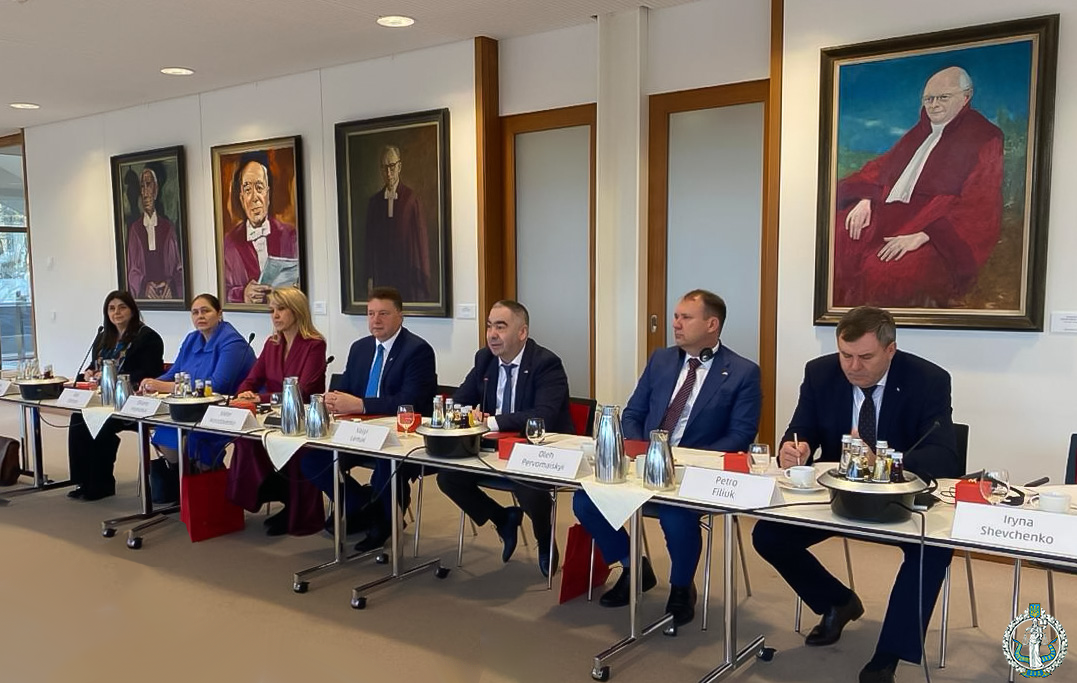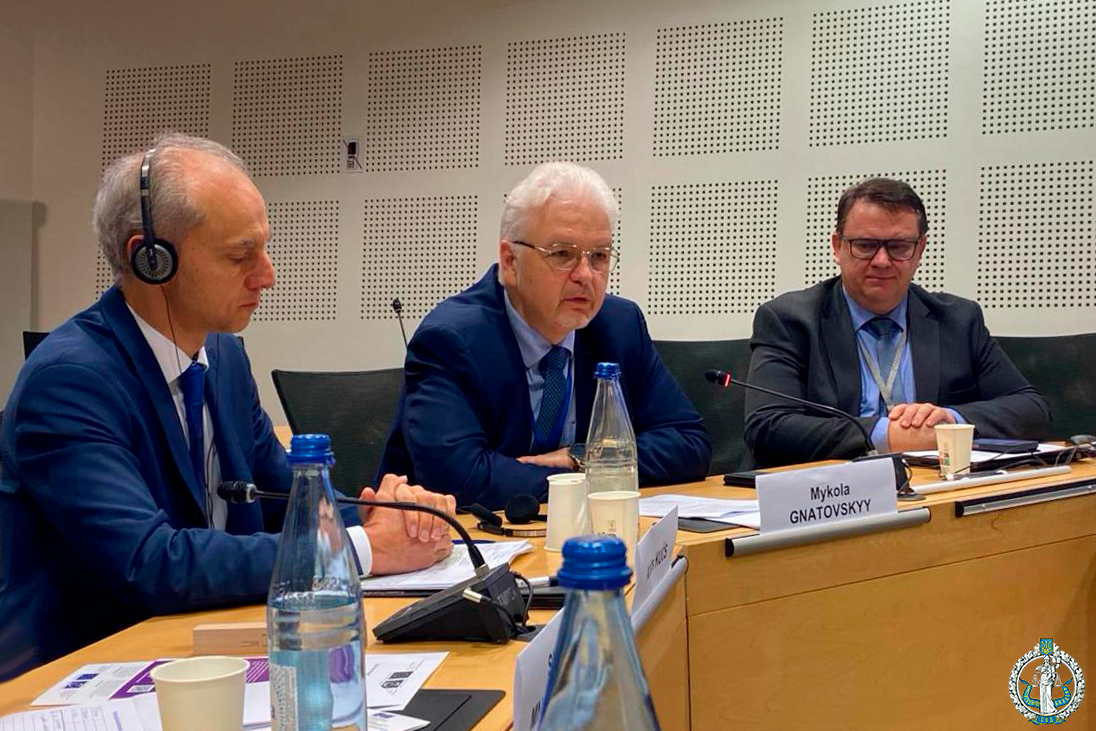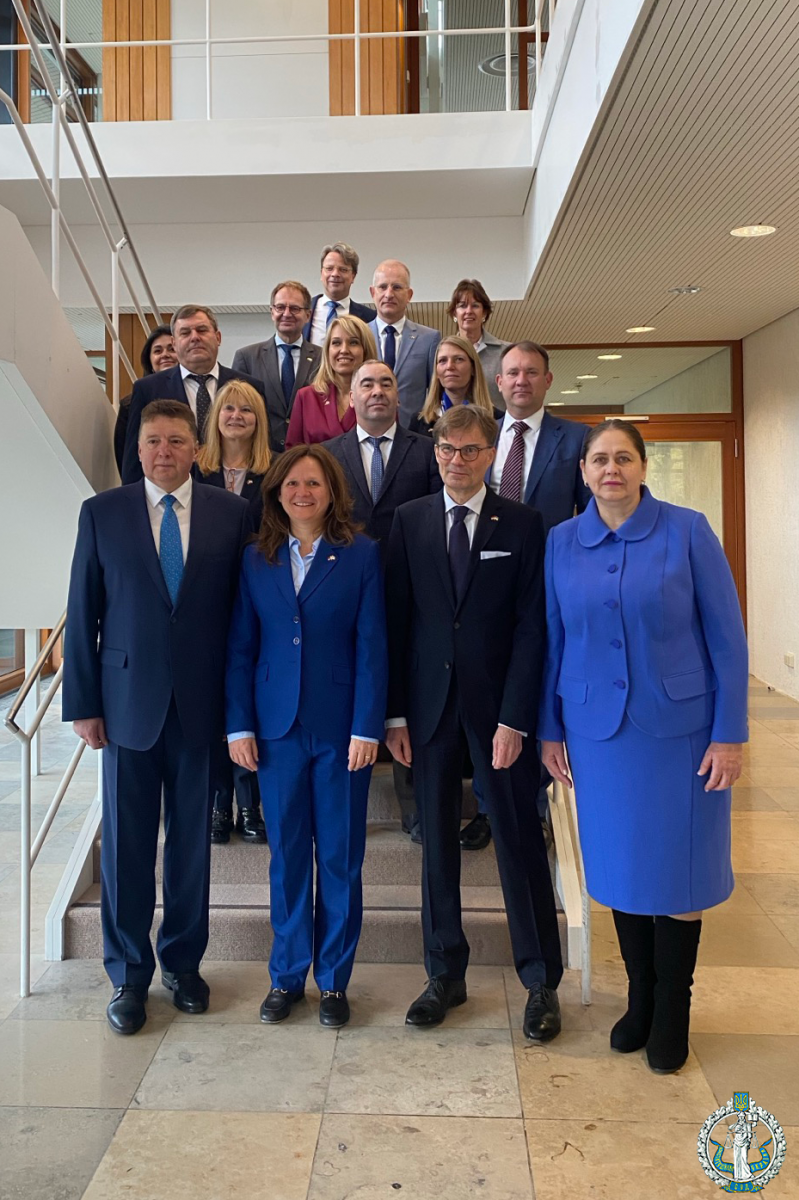November 26, 2024
On 18-21 November 2024, a delegation of the Constitutional Court of Ukraine paid a working visit to the Federal Republic of Germany and the French Republic. The judges visited the Federal Constitutional Court of Germany, the Max Planck Institute for Comparative Public Law and International Law, the European Court of Human Rights and the Council of Europe. This visit was an important step in strengthening international cooperation, sharing experience and bringing Ukraine closer to the European legal space.
The delegation was composed of judges of the Constitutional Court of Ukraine Viktor Gorodovenko (head of the delegation), Oksana Hryshchuk, Vasyl Lemak, Alla Oliinyk, Oleg Pervomayskyi, and Petro Filiuk.
On 18 November, the delegation of the Constitutional Court of Ukraine held a meeting with legal experts at the Max Planck Institute for Comparative Public Law and International Law (Heidelberg, Germany). During the meeting, Judge of the Constitutional Court of Ukraine Vasyl Lemak delivered a report on “International and foreign law as an argument in the jurisprudence of the Constitutional Court of Ukraine”.
Former Judge of the Federal Constitutional Court of Germany, Prof. Dr. Reinhard Geyer presented a report on the application of international law as an auxiliary means of interpreting the Constitution. In his speech, he drew attention to how international law can influence national legislation.
The discussion was joined by Prof. Dr. Udo Steiner, a former judge of the Federal Constitutional Court of Germany, and Dr. Matthias Hartwig, a research fellow at the Max Planck Institute for Comparative Public Law and International Law.
Judge of the Constitutional Court of Ukraine Oksana Hryshchuk presented a report on “Ukrainian Constitutional Identity in the Context of European Integration”. The discussion highlighted the importance of combining the national legal tradition with modern European standards, which become the basis for reforms.
Judge of the Constitutional Court of Ukraine Oleg Pervomayskyi presented a report on the topic “Institute of Constitutional Complaint: Ukrainian Experience”. German experts, in particular Prof. Dr. Reinhard Gaier and Prof. Dr. Udo Steiner, shared their experience of the functioning of this mechanism in Germany, in particular its role in protecting human rights.
On 19 November, a delegation of the Constitutional Court of Ukraine visited the Federal Constitutional Court of Germany. This meeting contributed to the strengthening of professional dialogue between the two leading constitutional institutions that play a key role in guaranteeing the rule of law and protecting constitutional rights.
Judge of the Federal Constitutional Court of Germany Henning Radtke stressed that cooperation between national constitutional courts is important for the protection of democracy in the face of global challenges.
The head of the Ukrainian delegation, Judge of the Constitutional Court of Ukraine Viktor Gorodovenko, in his speech focused on the peculiarities of the functioning of the Constitutional Court of Ukraine in the context of war. He paid special attention to the independence and institutional capacity of the Constitutional Court of Ukraine, as well as the role of the Constitutional Court of Ukraine in the process of Ukraine's integration into the European legal community.
In the course of professional discussions, the participants discussed the correlation between the case law of national constitutional courts and the case law of supranational courts. Judges of the Federal Constitutional Court of Germany Miriam Meßling and Holger Wöckel shared their experience of harmonising the decisions of the national constitutional court with the case law of the ECHR and the EU Court of Justice.
During the discussion, Judge of the Constitutional Court of Ukraine Viktor Gorodovenko presented a report on “Interaction of constitutional courts with supranational courts (on the example of the EU Court of Justice and the ECHR)”.
The judges also learnt about the organisational aspects of the work of the Federal Constitutional Court of Germany. Volker Batzke, Head of the Court's Secretariat, and Sigrid Krause-Reul, Government Director, spoke about the procedure for reviewing petitions, managing court proceedings, and the specifics of the functioning of the German constitutional control body.
On the same day, the delegation of the Constitutional Court of Ukraine held a meeting with Angela Schmeink, Project Manager for Ukraine and Vietnam, German Foundation for International Legal Cooperation, and Wolfram Hertig, Senior Project Manager of the German Foundation for International Legal Cooperation (IRZ), to discuss the results of joint activities and key areas for further cooperation. The cooperation that has been going on between the Constitutional Court of Ukraine and the Foundation for almost three decades demonstrates a high level of partnership aimed at improving the activities of the constitutional jurisdiction body and creating an effective mechanism for the protection of human rights in the face of current challenges.
On November 20, the delegation of the Constitutional Court of Ukraine visited the European Court of Human Rights in Strasbourg, where it attended the Grand Chamber hearing in the case of Kovačević v. Bosnia and Herzegovina. This case concerns possible discrimination in the exercise of voting rights and representation of national minorities in Bosnia and Herzegovina.
On November 21, the delegation paid a working visit to the Council of Europe in Strasbourg, where it held a number of meetings.
In particular, the meeting with the with representatives of the Directorate of Human Rights (Directorate General of Human Rights and Rule of Law, DG-I) was attended by Lilja Gretarsdottir, Head of the Cooperation Programmes Division, Directorate General of Human Rights and Rule of Law (DG-I), Andrii Kavakin, Projects Coordinator, Cooperation Programmes Division, Directorate General of Human Rights and Rule of Law (DG-I), and Siuzanna Mnatsakanian, Manager of the Council of Europe Project “PGG-III: Support to development of the constitutional justice in Ukraine”.
During the meeting, Lilja Gretarsdottir emphasized that during the meeting of the Committee of Ministers of the Council of Europe, the tragic milestone of 1000 days of Russia's full-scale aggression against Ukraine was noted. She noted that despite the war, it is important that the Constitutional Court of Ukraine and other state institutions continue to fulfill their mandate. Lilja Gretarsdottir emphasized that violations of human rights and international law are unacceptable. In view of this, the Council of Europe is ready to develop cooperation with Ukraine within the framework of the Council of Europe Action Plan for Ukraine for 2023-2026 “Resilience, Recovery and Rebuilding”, which aims to increase the resilience of state institutions by strengthening democratic governance and the rule of law, as well as protecting human rights.
In his turn, Viktor Gorodovenko, on behalf of the Constitutional Court of Ukraine and the Secretariat of the Court, thanked for the support and concrete actions taken by the Cooperation Programs Division of the Directorate General of Human Rights and Rule of Law. Thanks to the project activities under the Council of Europe Action Plan, the institutional capacity of the constitutional control body in Ukraine has been strengthened. The national constitutional control body is currently applying the best practices and experience of the constitutional courts of European countries, in particular the Federal Constitutional Court of Germany and the Constitutional Court of the Republic of Latvia. Most of the decisions of the Constitutional Court of Ukraine on constitutional complaints apply the case law of the European Court of Human Rights.
The most anticipated meeting was the meeting of the delegation of the Constitutional Court of Ukraine with ECHR judges Mykola Gnatovskyy (Ukraine) and Artūrs Kučs (Latvia). During the meeting, the ECHR judges noted that the dialogue between the European Court of Human Rights and constitutional courts remains extremely important. During the meeting, the parties had an opportunity to discuss issues of the ECHR case law.
During the meeting with Simona Granata-Menghini, Director, Enlarged Agreement on Democracy through Law (Venice Commission), and Vahe Demirtshyan, Legal Adviser, Enlarged Agreement on Democracy through Law (Venice Commission) and Mamuka Longurashvili, , Legal Adviser, Enlarged Agreement on Democracy through Law (Venice Commission), the judges of the Constitutional Court of Ukraine outlined the problematic issues of the constitutional control body and discussed ways to solve them.
During the meeting between the delegation of the Constitutional Court of Ukraine and the Department for the Execution of Judgments of the European Court of Human Rights, the parties discussed areas of further cooperation, in particular, the resolution of issues that require the attention of the Constitutional Court of Ukraine. The meeting was attended by Pavlo Pushkar, Head of Division, Department for the Execution of Judgments of the European Court of Human Rights, Ketevan Tskhomelidze, Head of Section, Department for the Execution of Judgments of the European Court of Human Rights, and Kyrylo Boicheniuk and Tamara Rakhyanska, lawyers of the Department for the Execution of Judgments of the European Court of Human Rights.
During the final meeting with Andrii Kavakin, Projects Coordinator, Cooperation Programmes Division, Directorate General of Human Rights and Rule of Law (DG-I), and Siuzanna Mnatsakanian, Manager of the Council of Europe Project “PGG-III: Support to development of the constitutional justice in Ukraine”, which is being implemented within the framework of the joint EU-Council of Europe Partnership for Good Governance Program, the positive dynamics in the implementation of the Project, which has become a catalyst for real change and contributes to strengthening the institutional capacity of the Constitutional Court, was noted. It is planned to continue the implementation of the Project and discuss further project activities.
Also on the same day, a delegation of the Constitutional Court of Ukraine held a meeting with Borys Tarasyuk, Permanent Representative of Ukraine to the Council of Europe. He spoke about the work of the Mission of Ukraine to the Council of Europe and informed the Court's delegation about the international compensation mechanism for compensation for damage caused by Russia's aggression.
The meeting was also attended by Viktor Nikitiuk. Deputy Permanent Representative of Ukraine to the Council of Europe and Iaroslav Zhydenko, Counsellor of the Permanent Mission of Ukraine to the Council of Europe.
The working visit of the delegation of the Constitutional Court of Ukraine to the Federal Republic of Germany and the French Republic was made possible thanks to the support of the German Foundation for International Legal Cooperation (IRZ) and the Project “Support to the Development of Constitutional Justice in Ukraine”, which is being implemented within the framework of the joint EU-Council of Europe Program “Partnership for Good Governance”.
Wolfram Hertig, Senior Project Manager of the German Foundation for International Legal Cooperation (IRZ), and Siuzanna Mnatsakanian, Manager of the Council of Europe Project “PGG-III: Support to development of the constitutional justice in Ukraine”, participated in all these events.





